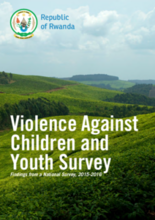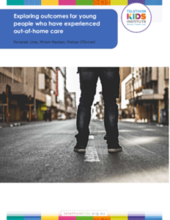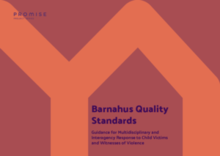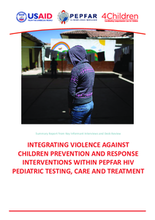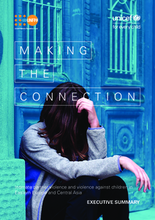Displaying 571 - 580 of 1090
This report presents findings from the national Violence Against Children Survey (VACS), administered in Rwanda from 2015-2016, and lays out recommendations for addressing and preventing violence against children based on those findings.
Exploring the testimonials collected during a focus group and 45 individual interviews with adult alumni of such institutions the Romanian research team enrolled in the SASCA Project revealed a wide range of forms of violence and traumatic consequences.
El presente manual proporciona a todos quienes están comprometidos con la tarea de poner fin a la violencia contra los niños la mejor información posible sobre la manera de ejecutar las estrategias INSPIRE.
For this study, physical and mental health, school achievement, justice involvement and child protection contact were explored for three cohorts of children in Australia born between 1 January 1990 and 30 June 1995.
This study explored the perceptions of experts and guardians regarding the early onset of misbehaviour in male, at-risk children in child and youth care centres in South Africa.
Drawing on international and European law and guidance and the Barnahus model, this document introduces ten good practice standards, the “European Barnahus Standards”, for multidisciplinary and interagency services for child victims and witnesses of violence in Europe adapted to the child.
This infographic, and accompanying answers to Frequently Asked Questions (FAQs), describes Adverse Childhood Experiences (ACEs) and their relationship to toxic stress, and explains the impacts of ACEs on children's development.
This research provides insight into the current intervention strategies used by social workers in emergency child protection, whereby children are removed from their caregivers as a result of abuse and are placed at child and youth care centres.
This report presents the preliminary findings from an ongoing project undertaken by 4Children that seeks to identify key opportunities to incorporate violence prevention and response interventions within priority PEPFAR Program Areas at clinical and community levels.
This report summarizes the main findings of the ‘Study on Violence against Women and Violence against Children,’ conducted in Albania, Belarus, Kazakhstan, the Kyrgyz Republic, Moldova, Turkey and Ukraine from 2016 to 2017, to identify major areas of overlap between intimate partner violence (IPV) and violence against children (VAC).

